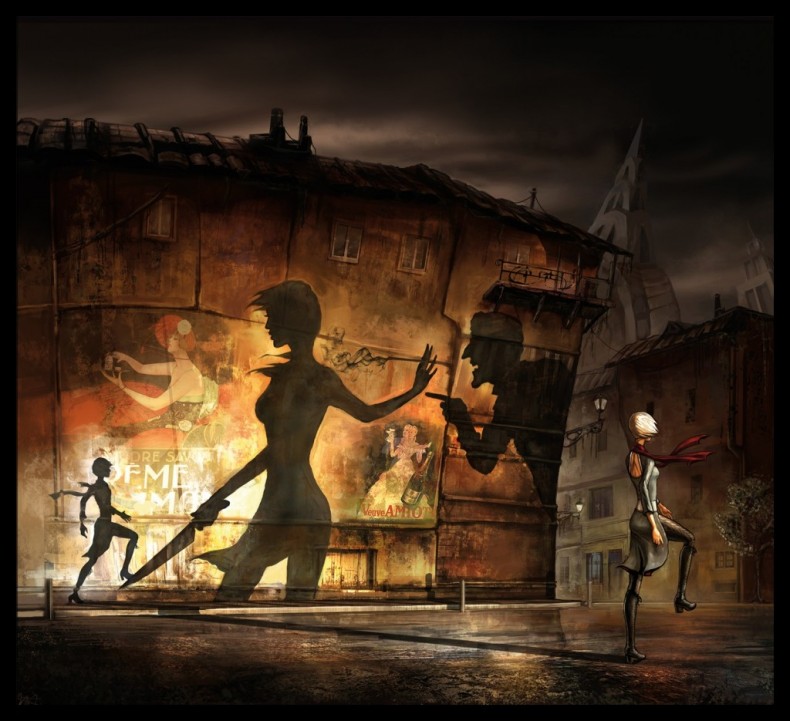Interview on Contrast, A Platformer Unlike Any Other

Those of you who keep up with the indie scene may be familiar with Contrast, the charming and intriguing soon-to-be platformer by Compulsion Games. Though many gamers have had their eyes on the title for quite some time, it’s still maintained an air of secrecy. Guillaume Provost and Sam Abbott of Compulsion found some time to sit down and answer a few of our questions.
First off, thank you for taking the time to speak to us! Can you tell us about yourself and the team?
So, we’re a small team of 8 guys and girls, based in Saint Henri in Montreal. I started Compulsion four years ago, and have slowly built up a team to raise money for and work on Contrast (our first original game). We’ve been working full time for 2 years on Contrast, and we’re looking forward to release!
What’s Contrast about?
Contrast is a puzzle platformer in which you explore the life of a little girl, Didi. You play as her imaginary friend, Dawn, and you must use your special abilities to help Didi uncover the truth about her family.
The gameplay features a lot of light manipulation and shadow use. How do these work?
Dawn’s main ability is to approach a wall, in 3D, and shift into the wall and become your shadow. You can then move on the shadows in 2D, and use this to reach areas that you couldn’t get to in the 3D world. You can also move objects and lights in the real world, to change the 2D shadow landscape. You choose when to do this, so the game is about using this ability to switch between the 3D and 2D worlds to solve our puzzles.

What were some of your biggest influences when conceptualizing Contrast?
In terms of video games, we were heavily inspired by the original Portal, in particular by the way that it challenged people to think differently about movement. Limbo and Bioshock also played roles in expanding how we think about gameplay and narrative (the importance of sound and drawing your own conclusions).
In terms of movies/visual style, we were influenced by Dark City, Tim Burton’s films, and Pan’s Labyrinth – creepy, ethereal characters, in a world very close to our own.
Can you tell us about Dawn and Didi? How do you personally feel about the representation of women in games, and is this something you’re consciously trying to change in Contrast?
Didi is a pretty adventurous girl, around 9 or 10 years old, who tends to spend a lot of time alone. You play as her imaginary friend, Dawn, so you’re usually reacting to what’s going on in Didi’s life.Â
As for women in games, we like the trend towards including more interesting female characters in games. However, we didn’t really set out to do that ourselves – we just wanted to create unique and creative characters. Dawn is unusual because she was conceptualized, designed and animated by women – she has a femininity and style all of her own.

It’s been said that the player’s choices will impact Didi’s future, and that light reveals “what stories remain in shadow.†In previous interviews, you weren’t able to talk much about this because things hadn’t quite been finalized. Are you able to speak more about it now, and does this mean there will be an element of player choice?
Yes, we can talk a bit more about it now. This has two aspects – first, in some cases, you literally shine lights on narrative scenes to advance the narrative, and in others the player interacts with the narrative elements themselves.
For the second, we wanted to create a narrative context where the player would feel a part of the story as it moves forward, and in doing so we originally penned multiple endings for the player to experience.
However, during focus testing, we felt that one of the two endings provided a more meaningful and rewarding conclusion to the story line, so we decided to focus on that.  Although having choice is always an interesting tool in game narration, I think listening to our feedback from players and providing the “right†outcome outweighed it.
The setting is unique and nice to look at. What were the biggest inspirations for the game’s look?
We really liked the idea of a setting that is like our own but is a little bit more magical – German expressionism, deco, early 20th century Europe all played a part in our unusual architectural style. Vaudeville and film noir combined to create our atmosphere – an era that never really existed, full of intrigue, shadows and illusions.

What’s your favorite aspect of the game so far?
Well, it’s my baby, so I like all of it! But I think I’m most happy with the universe and style that we’ve created – it’s an really interesting setting, and has so much potential to tell great stories.
What do you want gamers to get from playing Contrast?
We’d like them to come away with a sense that they’ve just been part of a new adventure – and hopefully, they’ve had a good time too.
How long will the game be, and when can we anticipate release?
The game runs around 4-5 hours right now, depending on how quickly a player picks up our mechanic. We are still in limbo in relation to release – we had mentioned May previously, but we’ve had some opportunities come up that have influenced our plans (in a good way!).
How would the team handle a zombie outbreak, and do you think you’d all manage to survive?
Well, we hired an intern for the summer, so it’s likely that he’d play the bait while we ran for safety. We’d give him the office nerf guns though, so that he has at least a shot of survival.
(It’s not a great shot though. Sorry Jake. It was good knowing you, buddy. Your Dota 2 skills held our team together. Good luck.)






